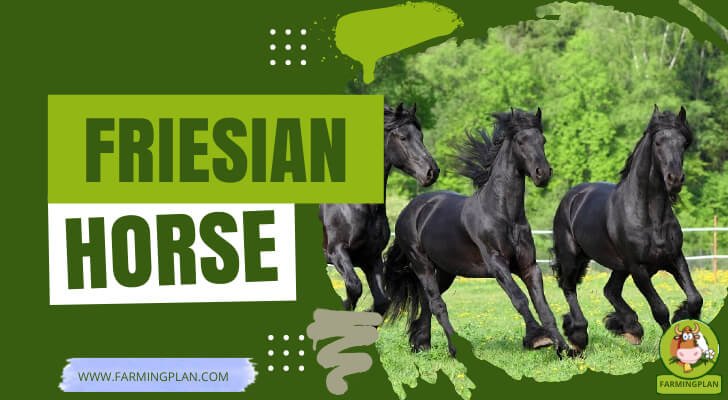The Friesian Horse is one of the world’s most majestic and recognizable horse breeds. Known for their striking black coats, long manes, and elegant movements, Friesians have captured the hearts of horse lovers and riders alike. These horses come from Friesland, a region in the Netherlands, and have a rich history that dates back to ancient times. Whether you’re a horse enthusiast, an aspiring owner, or simply curious, this guide will explore everything you need to know about Friesian horses, including their history, characteristics, care, training, and much more.

Friesian Horse Characteristics
Friesian horses are famous for their unique appearance. They are large, strong, and graceful animals with glossy black coats that set them apart from most other breeds. Friesians are typically between 15.2 and 17 hands tall, with a muscular build and a flowing mane and tail that contribute to their majestic presence. The breed’s most distinguishing feature is its coat color, almost always black, though some may have small white markings on the face or legs. Its long, thick manes and tails make it look stunning and elegant. Its movement is smooth and high-stepping, with an impressive trot that makes it a popular choice for dressage and other equestrian disciplines.
Friesian horses are known for their friendly and intelligent temperament. They are generally calm and patient, making them well-suited for riders of all levels. However, they are also susceptible and need consistent training and care to stay healthy and happy.
History of the Friesian Horse
The Friesian Horse has an ancient and fascinating history. Originating in Friesland, a region in the northern Netherlands, this breed dates back over 2,000 years. Early Friesians were bred for various purposes, including as warhorses, farm animals, and carriage horses. In the Middle Ages, Friesian horses were highly valued for their strength, agility, and stamina. They were used in battle, pulling knights in armor and transporting goods and people. Their ability to carry heavy loads made them essential in agriculture as well.
However, the breed nearly went extinct in the 19th century. The introduction of lighter horse breeds and the decline of warhorses led to a decrease in Friesian numbers. It wasn’t until the 20th century, when breeding programs were introduced that the breed saw a revival. Today, Friesians are loved for their beauty and versatility, excelling in dressage, driving, movies, and TV shows.
Read More: Belgian Draft Horse: The Ultimate Workhorse for Modern Farms
Friesian Horse Care
Caring for a Friesian horse involves attention to detail, as these horses require proper nutrition, grooming, and medical care to stay healthy.
- Grooming: Friesians are known for their long, thick manes and tails, which need regular grooming. Brush their coats frequently to prevent tangles and keep them looking shiny and healthy. Please pay special attention to their hooves, as regular trimming is necessary to maintain their structure and comfort. Be sure to regularly clean their ears and eyes, as Friesians can be prone to discharge.
- Nutrition: Friesian horses need a balanced diet with good quality hay, fresh grass, and appropriate grains. They are not prone to obesity but require enough calories to maintain their muscle mass and energy levels. Always consult a veterinarian or equine nutritionist to determine the best diet for your Friesian horse.
- Health Care: Like all horses, Friesians require regular veterinary care, including vaccinations, dental checkups, and parasite control. These horses are generally healthy but can be prone to joint issues, particularly as they age. Monitoring their weight and activity levels is essential to prevent joint stress.
Training and Riding a Friesian Horse
Training a Friesian horse requires patience, consistency, and a gentle hand. These horses are brilliant and learn quickly but are also sensitive and can become stressed if trained too harshly.
- Basic Training: Start with groundwork exercises, such as leading, haltering, and standing still. Once your horse is comfortable with these tasks, move on to riding. Use positive reinforcement, such as treats or praise, to encourage good behavior.
- Riding Tips: Friesians are known for their smooth gait, making them excellent for dressage and other forms of riding. They perform a beautiful trot, often described as “floating.” For riding, it’s essential to keep them balanced and not to overwork them. Friesians thrive when they are given time to rest and relax.
- Advanced Training: Friesians can excel in advanced dressage movements due to their natural grace and strength. However, they require a rider who can communicate clearly and maintain control. If you’re new to Friesians, consider working with a professional trainer to help develop your skills.
Read More: Ardennes Horse: Why This Mighty Breed Is Perfect for Challenging Tasks
Friesian Horse Breeding
Breeding Friesian horses carefully involves selecting the right pair for optimal health, temperament, and conformation.
- Breeding Process: When breeding Friesians, focusing on the bloodline and health of both the mare and the stallion is essential. Many breeders seek out Friesians with a strong lineage to preserve the breed’s qualities. It’s crucial to ensure that the horses involved in breeding are in good health and free from genetic conditions.
- Breeding Goals: The goal of breeding Friesians is to produce horses that are not only beautiful but also healthy and strong. The ideal Friesian horse should have a muscular body, a smooth gait, and a calm demeanor. Breeding for conformation, temperament, and athletic ability is key.
- Breeding Challenges: As with any breed, there are challenges in Friesian horse breeding. Ensuring that both horses are compatible regarding health, size, and temperament can be difficult. Genetic testing is often recommended to avoid hereditary health issues affecting the offspring.
Common Myths About Friesian Horse
Despite their popularity, several myths about Friesian horses often mislead potential owners and enthusiasts.
- Myth 1: Friesian horses are difficult to train.
- Truth: While Friesians are sensitive and require a gentle approach, they are also intelligent and quick learners. They can excel in various disciplines, including dressage and driving, with proper training.
- Myth 2: Friesians are high-maintenance horses.
- Truth: Friesians require regular grooming and care, but they are no longer high-maintenance than other breeds. Regular veterinary care and a balanced diet are key to keeping them healthy.
- Myth 3: Friesian horses are only for experienced riders.
- Truth: Friesians are generally calm and patient, making them suitable for riders of all levels. However, beginners should still receive proper training to develop their riding skills.
Read More: The Majestic Shire Horse: A Gentle Giant with a Rich History
Friesian Horses in Pop Culture
Friesian horses have gained widespread recognition thanks to their appearances in popular films and TV shows. Their striking beauty makes them a natural fit for the big screen.
- In Movies and TV Shows, Friesians are often used in movies as majestic steeds or heroic horses. They appeared in films like The Mask of Zorro and The Black Stallion. Their graceful appearance and strong presence make them a favorite in the entertainment industry.
- In Advertising, Friesian horses are also seen due to their stunning looks. Many brands use them to represent power, beauty, and elegance.
- At Public Events: Friesians are often featured in parades, exhibitions, and cultural events, where their graceful movements and striking appearance make them stand out.
Tips for Caring for a Friesian Horse
Caring for a Friesian horse involves providing them with a balanced lifestyle. Here are some helpful tips:
- Regular Exercise: Friesians are athletic horses and require regular exercise to stay in top condition. Ensure they have ample space to move and run freely.
- Quality Diet: Feed your Friesian a high-quality diet, including hay, fresh grass, and grains. Continuously monitor their weight and condition.
- Consistent Grooming: Friesians require regular grooming to maintain their coat and prevent tangles in their long manes and tails
- Check for Health Issues: Regular veterinary checkups are essential for avoiding common health problems in Friesian horses, such as joint and respiratory problems.
FAQ
Are Friesian horses suitable for beginners?
Yes, Friesian horses are generally calm and patient, making them suitable for beginners with proper training.
How long do Friesian horses live?
Friesians typically live between 15 and 20 years, although some may live longer with proper care.
Are Friesian horses expensive?
Due to their unique qualities and popularity, Friesian horses can be expensive. The cost can vary depending on the horse’s age, training, and lineage.
Do Friesians need special care?
Friesians require regular grooming, a balanced diet, and consistent veterinary care to stay healthy. However, they are not more high-maintenance than other breeds.
Can Friesian horses be used for competitions?
Friesians excel in dressage and other equestrian competitions due to their smooth gaits and athleticism.
Conclusion
Friesian horses are a beautiful and versatile breed that makes an excellent choice for riders of all levels. Their stunning appearance, gentle temperament, and graceful movements make them ideal for dressage, driving, and leisure riding. Whether you’re interested in their rich history, impressive characteristics, or simple care needs, Friesian horses will surely capture your heart. If you’re considering owning one, be prepared to provide them with proper care, training, and attention, and you’ll be rewarded with a loyal and majestic companion.


